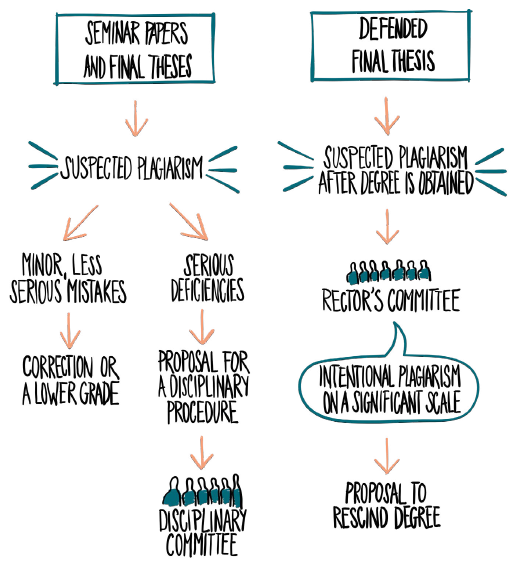Consequences of plagiarism
Plagiarism is not only shameful, but it also constitutes a serious breach of academic integrity. Any cases uncovered are usually dealt with directly by the university. Plagiarism is monitored among students, alumni, as well as academic staff. Here, we will consider the first two groups.
The process of dealing with plagiarists is guided by internal regulations of individual universities and faculties, and the Higher Education Act. Since plagiarism might also constitute an intellectual property offence, the Copyright Act and the Criminal Code might also be relevant.
What to do with a student who plagiarises
When plagiarism is suspected, it is first decided whether the case in fact constitutes plagiarism or not. It is then determined how the case should be dealt with. At our universities, both questions are usually addressed by the same committee, which makes a decision about both the guilt or innocence of the (alleged) plagiarist and his or her punishment.
The severity of the punishment depends on whether or not the plagiarism was intentional, on its extent, seriousness and the motivation for cheating. The type of work is also taken into account, together with the level of experience of the student, his or her conduct and any attempts to remedy the situation. That means that the university will deal differently with plagiarism in a seminar paper of a first-year bachelor student than plagiarism in a master’s thesis.
Each university and also each faculty has slightly different internal regulations, which guide the process of dealing with plagiarism. It usually looks like this:

Student vs. alumnus
Universities may consider plagiarism committed by a student as a disciplinary offence. This is reviewed by a disciplinary committee. According to the seriousness of the offence, it might be dealt with by issuing a warning or deciding on a conditional, or even unconditional, expulsion of the student from the university. The last option is only considered in cases of intentional plagiarism.
Universities can now also penalise their alumni for plagiarism. That is within the responsibility of a rector’s review committee. In the most severe cases the academic degree can be rescinded. Such punishment is applied in cases of intentional plagiarism which constitutes a serious violation of the Copyright Act.
When the law steps in
Plagiarism might also have legal consequences beyond academia. The aggrieved author or those who hold the rights to the work may d emand rectification of the breach, an apology or financial compensation. A serious violation of intellectual property rights that has a harmful impact on society might also be treated as crime; this carries a penalty of up to two years imprisonment.
Honesty is key
We can easily avoid all these punishments by being aware of what plagiarism is and how to avoid it. That includes knowing the correct rules of referencing, and naturally studying with integrity.